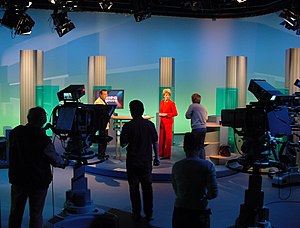
Back برنامج تلفزيون Arabic برنامج د تلفازة ARY Тэлевізійная праграма Byelorussian Телевизионно предаване Bulgarian टीवी शो Bihari টেলিভিশন অনুষ্ঠান Bengali/Bangla Abadenn skinwel Breton Programa de televisió Catalan زنجیرەی تەلەڤیزیۆنی CKB Televizní pořad Czech

A television show, TV program, or simply a TV show, is the general reference to any content produced for viewing on a television set that is traditionally broadcast via over-the-air, satellite, or cable. This includes content made by television broadcasters with in-house productions and content made for broadcasting by film production companies. It excludes breaking news, advertisements, or trailers that are typically placed between shows. Television shows are most often scheduled for broadcast well ahead of time and appear on electronic guides or other TV listings, but streaming services often make them available for viewing anytime. The content in a television show is produced by one of two production methodologies: live taped shows such as variety and news magazine shows shot on an in-house television studio stage or sporting events (all considered linear productions.) The other production model includes animation and a variety of film productions ranging from movies to series. Shows not produced on a television studio stage are usually contracted or licensed to be made by appropriate production companies.
Television shows can be viewed live (in a linear/real time fashion), recorded on home video, a digital video recorder for later viewing, viewed on demand via a set-top box, or streamed over the internet. A television show is also called a television program (British English: programme), especially if it lacks a narrative structure. In the United States and Canada, a television series is usually released in episodes that follow a narrative and are usually divided into seasons. In the UK, a television series is a yearly or semiannual set of new episodes. In effect, a "series" in the United Kingdom, Ireland, and Australia is the same as a "season" in the United States and Canada. A small or one-off collection of episodes may also be called a limited series, TV special, or miniseries. A television film, or telefilm, is a feature film created for broadcasting on television.